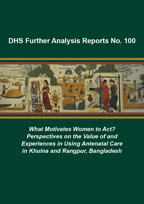- PUBLICATIONS
- JOURNAL ARTICLES
- ACCESS PUBLICATIONS
Publications Summary
- Document Type
- Further Analysis
- Publication Topic(s)
- Gender, Maternal Health
- Country(s)
- Bangladesh
- Survey
- Bangladesh DHS, 2014
- Language
- English
- Recommended Citation
- Nahar, Quamrun, Marzia Sultana, Kerry L. D. MacQuarrie, and Rasheda Khan. 2016. What Motivates Women to Act? Perspectives on the Value of and Experiences in Using Antenatal Care in Khulna and Rangpur, Bangladesh. DHS Further Analysis Reports No. 100. Dhaka, Bangladesh and Rockville, Maryland, USA: National Institute of Population Research and Training (NIPORT), International Center for Diarrhoeal Disease Research, Bangladesh (icddr,b), and ICF International.
- Download Citation
- RIS format / Text format / Endnote format
- Publication Date
- March 2016
- Publication ID
- FA100
Download
 What Motivates Women to Act? Perspectives on the Value of and Experiences in Using Antenatal Care in Khulna and Rangpur, Bangladesh (PDF, 1242K)
What Motivates Women to Act? Perspectives on the Value of and Experiences in Using Antenatal Care in Khulna and Rangpur, Bangladesh (PDF, 1242K)
Download this publication
There is no printed copy available to order.
